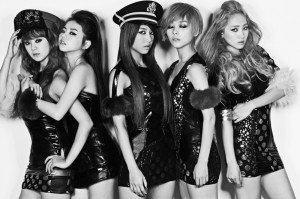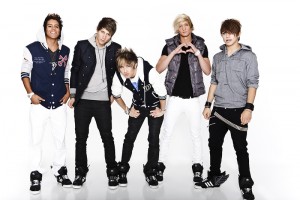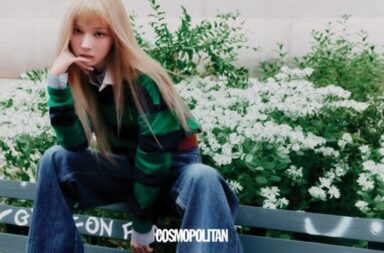In his 1981 classic tribute to the American immigrant, singer-songwriter Neil Diamond wrote the words, “Got a dream to take them there / They’re coming to America.” While Mr. Diamond certainly didn’t have Lee Soo-man and JYP in mind when he penned these immortal lyrics, it’s become pretty clear by now that both SM Entertainment and JYP are dreaming of the potential buckets and buckets of money that await them — that is, should their agencies manage to find success — real, honest-to-goodness success — in the United States. 2012 may just see their attempts at expansion take on an (even greater) element of rivalry. This is, of course, in reference to SNSD and the Wonder Girls . Given the fact that Super Junior is essentially standing on its last perfectly-toned leg and no other groups in either company have hinted at or attempted to shower the US market with glitter and guyliner, it’s safe to assume for the moment that should we have a showdown in the (Wild) West, these gorgeous ladies will be at the fore.
. Given the fact that Super Junior is essentially standing on its last perfectly-toned leg and no other groups in either company have hinted at or attempted to shower the US market with glitter and guyliner, it’s safe to assume for the moment that should we have a showdown in the (Wild) West, these gorgeous ladies will be at the fore.
You don’t have to be a S♥NE or a Wonderful in order to prefer one of these two groups over the other; I myself have been a die-hard fan of SNSD since “Gee” rocked the charts in 2009. However, even the most ardent of fans has to force him or herself to be objective when it comes to the practicalities of advancing into a market as challenging as the US. This means: trying your best not to pretend that a successful concert in Madison Square Garden means that everyone and their mother will download the maxi release of “The Boys” (which features a gem of a remix called “Bring Dem Boys Out.” I think I just felt a blood vessel burst.) or buy tickets to see BoA‘s version of Dirty Dancing new movie Cobu 3D. Success in the US requires certain elements — elements that both groups are currently lacking in varying degrees, and it remains to be seen how well they will be able to fill in the gaps.
The first and most obvious obstacle is the inevitable language barrier. Essentially, success in the US is equivalent to a relatively high degree of mastery of English. Here, the Wonder Girls likely have an advantage; regardless of their success or failure, they have extensive experience promoting in the US media. Indeed, when one compares the Wonder Girls’ most recent English release to that of SNSD’s, there is no contest as to who has done their English homework. Though the English versions of both “Be My Baby” and “The Boys” are a bit on the ridiculous side lyrics-wise, there isn’t much in the Wonder Girls’ English pronunciation that immediately suggests to me that they are not native speakers. This is not so for SNSD. I visibly cringed when I first heard Sunny sing, “I know that life is a mee-stery / I’m gonna make hee-sto-ree.” I do not necessarily believe that the US market is particularly hostile to Asian/Asian-American artists, but such poor pronunciation and obvious accent will invite parody and ridicule. Anyone remember William Hung‘s rendition of “She Bangs” on American Idol? Take a moment to think about why exactly the American media took that one and ran with it. Here’s a hint: it probably was not because of his choice of clothes. So when it comes to pronunciation in songs, Wonder Girls has the upper hand.
[youtube http://www.youtube.com/watch?v=0d5eP0wWLQY]But, you might say, SNSD has two trump cards in its enormous arsenal: two bonafide, born-and-bred Americans who speak unaccented English — an invaluable asset when it comes to public relations and promotions in an English-speaking country. Granted, the Wonder Girls’ Yoobin has lived in the United States in the past and speaks English at an alright level of fluency, but SNSD’s Tiffany and Jessica have the advantage of having grown up speaking English as their mother tongue. However, in one of the most incredibly asinine (but nonetheless unsurprising) moves I’ve ever seen SM Entertainment make, Tiffany was given two paltry rap lines in the entirety of “The Boys.” It would seem logical to play to your strengths when releasing a song in English; if you’ve got girls who don’t need to be consistently drilled in pronunciation, it would make sense to make ample use of them, especially if they happen to be on the more talented side when it comes to vocals. For crying out loud, when half of the song is rapping, don’t give Yoona a singing line in the music video or live performances! What sort of mismanagement is this? Where is Tiffany?! Even when some of the pieces are in place, it seems that SM Entertainment is ill-equipped to propertly put them to work. Another plus one for JYP.
A second obstacle is equally oft-cited: that the US is “over” music groups. I originally resided firmly in this thought camp, but have begun to reconsider. The popularity of Broadway musicals and Glee (as cited in Gio’s article) indicates to me that there is still plenty of room in America for large groups of people singing and dancing in a coordinated fashion (preferably spontaneously!). Despite the  complete troll that was Heart2Heart, I think that a singing group done well could actually make a noticeable dent in the music market, perhaps even paving the way for others to succeed as well.
complete troll that was Heart2Heart, I think that a singing group done well could actually make a noticeable dent in the music market, perhaps even paving the way for others to succeed as well.
But this in and of itself requires a delineation of what a singing group “done well” would look like, and thus brings me to the third and final obstacle: a noticeable lack of musical talent or originality. Believe me, I love SNSD, I appreciate the Wonder Girls, and I fangirl like it’s 1999 whenever they release something new into the Korean market. But no amount of love or fuzzy fangirl feelings is enough to cover up the harsh reality that both groups are lugging around some pretty hefty musical dead weight. And this is something that is not easily neutralized. While each member of SNSD and the Wonder Girls bring something to the overall dynamic of each group, it isn’t always raw musical talent, and this is an enormous problem for any debut in the US. In South Korea, idols don’t necessarily rely on the quality of their music to sell a song; there are beautifully shot and dynamic music videos, variety show appearances, talk shows, CFs, and numerous other means of promotion. However, this element is largely absent from the US market. The music that these groups put out, therefore, needs to sell itself largely on its own merit. I question whether either of these groups is prepared to produce music that can do this. It happens far too often that I find myself impressed with a K-pop performance simply because somewhere around 75% of it was sung live and everyone was more or less on key. It almost makes me forget visiting Madison Square Garden as a wide-eyed twelve-year-old to see N’Sync‘s “No Strings Attached” tour, a concert in which those boys were so on the mark in every aspect of performance that even my mother was suitably impressed. As long as SNSD and the Wonder Girls continue to lack in their stage performances, I think it will be very, very difficult for anyone who wasn’t previously a K-pop fan to take them seriously as artists in the US.
All things considered, I’d very much prefer that neither group moved any further along in their intended takeover of the US market; if you put a gun to my head and demanded I choose one to ultimately have greater success than the other, I’d likely waffle back and forth before deciding that neither of them has a fighting chance and naming Brown Eyed Girls as my number one pick to succeed in the US market. But with the Wonder Girls’ Nickelodeon TV movie set to air in the first quarter of 2012, the game may very well shift in their favor. What do you think, readers? Which group (if either) is more poised to take the US by storm?


